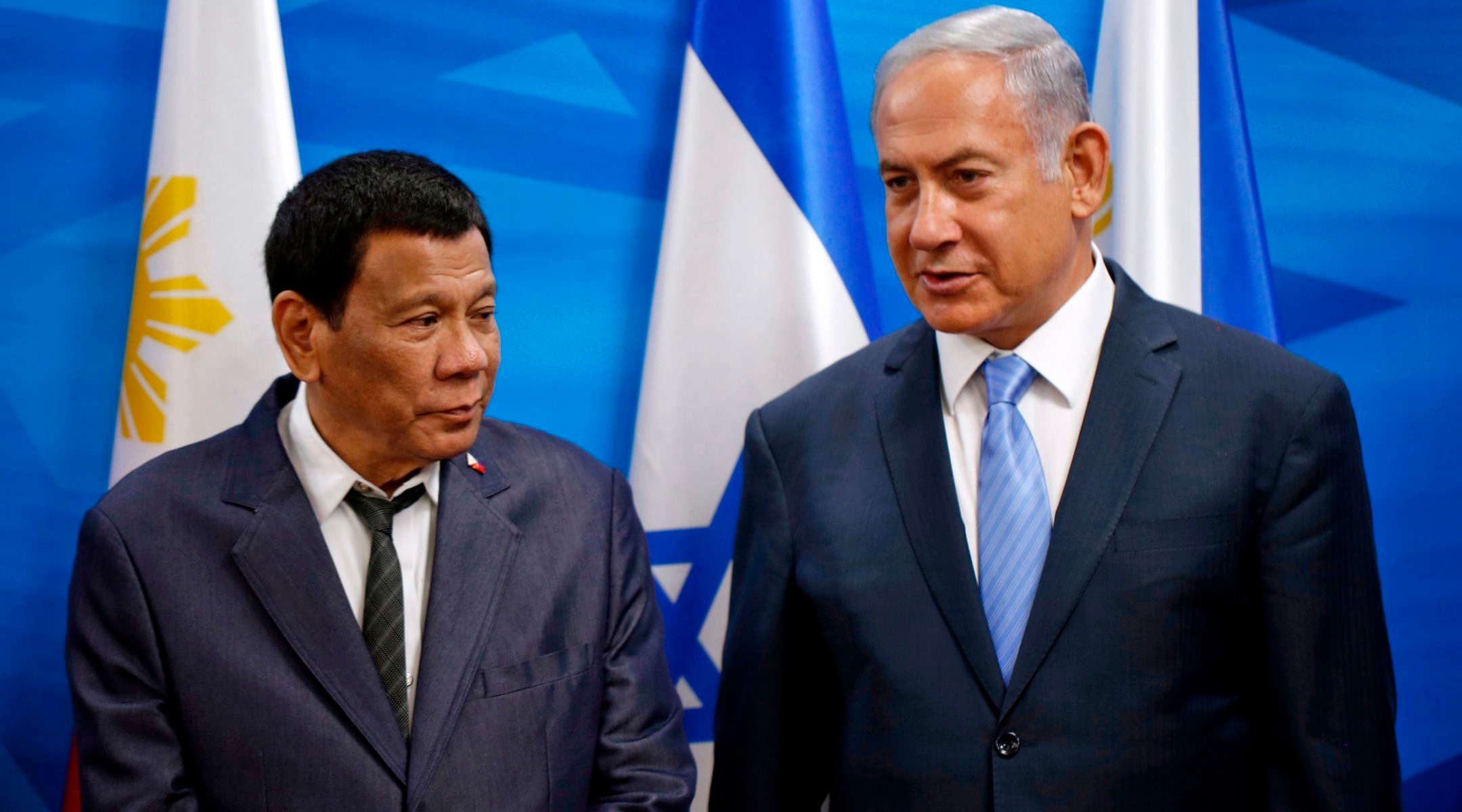BOSTON (JTA) — On Nov. 5, Blue and White party leader Benny Gantz said that Israel should avoid selling weapons to repressive regimes. While it might seem like an obvious move for the Jewish state, Gantz’s comments marked a stark contrast with Prime Minister Benjamin Netanyahu’s doctrine — especially given Netanyahu’s relationship with President Rodrigo Duterte of the Philippines.
Even among strongmen, Duterte is uniquely repugnant. He has launched a brutal crackdown on political opponents and drug users, and has publicly pledged to kill millions in his country.
Netanyahu has hosted Duterte for a widely publicized state visit, sold arms to him and sent delegations to help train the Philippines military.
Should Gantz manage to assemble a coalition and become prime minister, he would do well to act on his comments and reassess Israel’s alliances with illiberal regimes. And he should start with the Duterte relationship, which offers Israel few strategic benefits and has resulted in no major diplomatic concessions or achievements.
Duterte has said publicly that his interest in Israel lies in lax Israeli arms export regulations. In cozying up to Netanyahu, Duterte has brought useful Israeli resources and military advisers to his country to train his military in counterterrorism. This is especially helpful to the Filipino president as he ratchets up counterterror operations and his sickening domestic repression campaigns against drug users and political opponents.
But the possible and existing gains for Israel are few and far between. Though Israel’s relationships with other autocrats have been and could be risky for their long-term strategic well-being and security, the potential payoffs of those relationships have been apparent.
In Saudi Arabia and the United Arab Emirates, Netanyahu has cultivated core alliances against Iran. And as the Saudi and Emirati regimes cooperate with Israel against the Islamic Republic, they continue to soften their rhetoric and positions on the Israeli-Palestinian conflict.
Israel’s alliances with illiberal regimes beyond the Middle East hold another set of potential benefits. Approaching Beijing could allow Israel to hedge against its previous bets on a West that in Netanyahu’s mind may well be in decline. Warming ties with China are one way to prepare for a changing global order in which China plays a larger role while opening the Israeli market to billions of dollars in trade and investment.
Similarly, relations with Russia are a perceived long-term investment for the Jewish state. In aligning with Vladimir Putin’s Russia, Israel is preparing for a new Middle East with a diminished U.S. presence.
Even in dealing with less powerful autocracies like Azerbaijan, the strategic endgame is clear. As part of its growing ties with Baku, Israel has reportedly gained access to an airstrip that could prove vital if the Israeli government decides to strike Iranian nuclear facilities or military installations.
But Duterte offers none of these benefits to Israel. Unlike Saudi, Emirati and Azerbaijani counterparts, Duterte is hardly useful to Israel’s strategy against Iran.
To make things worse, Netanyahu has failed to extract any tangible diplomatic concessions from Duterte. The Philippine Foreign Affairs Department announced in 2018 that it would not move its embassy to Jerusalem. It has not cast any important United Nations votes in Israel’s favor since 1947 and, unlike Russia and China, does not have veto power on the U.N. Security Council.
Netanyahu’s choice to work with Duterte reflects longstanding Israeli doctrine. Conventional Israeli wisdom argues that Israel operates in hostile environs and can use as many allies as possible. These alliances are said to bring international legitimacy to Israel as it continually fights delegitimization and condemnation at the United Nations and elsewhere.
But aligning with a leader who compared himself to Hitler and vowed to kill 3 million people in his country is hardly helpful in the international arena — especially considering Duterte’s penchant for abhorrent repression, controversy and bad publicity.
Netanyahu’s dance with Duterte is also driven by domestic political considerations. In recent years, and in the 2019 elections in particular, the prime minister has touted his ability to build and sustain alliances. Photos of Netanyahu and his counterparts adorn billboards in Israel emblazoned with his campaign slogan: “Netanyahu. In another league.”
Gantz ran a different kind of campaign. Judging from his comments, he does not share Netanyahu’s worldview. If anything, Gantz’s remarks could foretell a new direction for Israeli foreign policy. Ultimately, it is too early to tell whether he will succeed in building a coalition or in reorienting Israeli strategy.
That aside, tenuous alliances with autocrats are an unfortunate and ill-advised facet of Israeli policy. But if Israel is willing to take on those risks to begin with, it should do so if (and only if) there are clear possible strategic gains on the horizon.
Israel has no endgame in Manila. Netanyahu’s partnership with Duterte has earned him a handful of trade and arms deals and a state visit. But those limited benefits come with grave risks and without any significant diplomatic achievements.
If Gantz becomes prime minister, he should follow through on his comments and chart a new doctrine. Reversing course on Israeli ties with Duterte would be a good place to start.
JTA has documented Jewish history in real-time for over a century. Keep our journalism strong by joining us in supporting independent, award-winning reporting.







